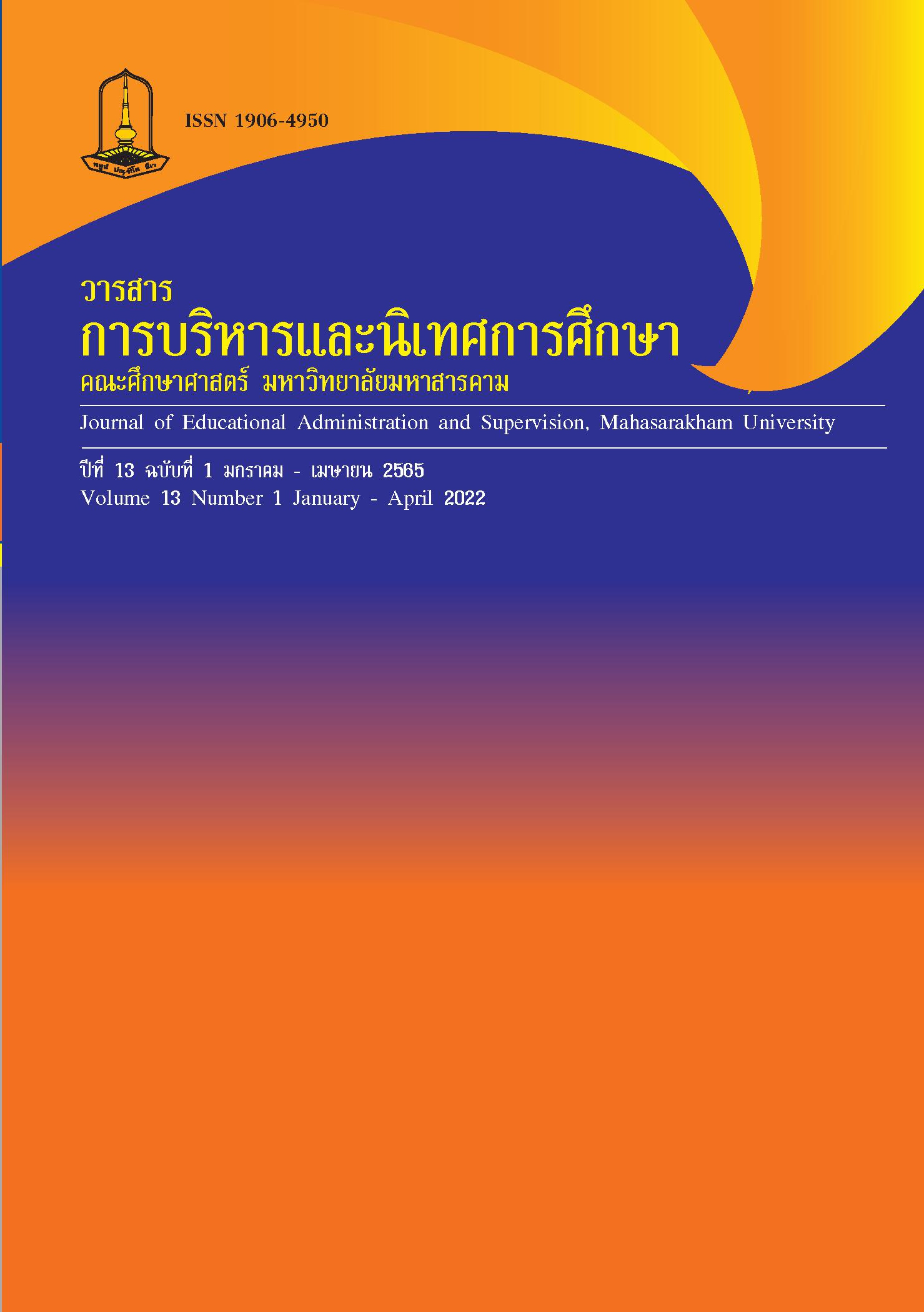Developing a Guideline to Strengthen Ethical Leadership of School Administrators under the Roi-Et Primary Educational Service Area Office 1
Main Article Content
Abstract
This research aimed: 1) to investigate the existing situations and desirable situations of school administrator ethical leadership under the Roi-Et Primary Educational Service Area office 1; and 2) to develop a guideline to strengthen ethical leadership of school
administrators under the Roi-Et Primary Educational Service Area office 1. Mixed methods research was employed with divided into two phases: the first phase was investigating existing situations and desirable situations of school administrator ethical leadership under the Roi-Et Primary Educational Service Area office 1. Samples used in this phase were 442 administrators and teachers. The second phase was developing a guideline to strengthen ethical leadership of school administrators and evaluated the propriety and possibility of guideline by 5 experts. The research instruments were five-rating scales questionnaire of existing and desirable situations, interview form, and guideline evaluation form. The statistics used were mean, standard deviation and priority needs index modification. The research results were: 1) the existing situations of school administrator ethical leadership under Roi-Et Primary Educational Service Area office 1 in overall was at the high level. When each aspect was considered, it was found that each aspect was at a high level. While the desirable situations in overall and each aspect was at the highest level. 2) A guideline to strengthen ethical leadership of school administrators under Roi-Et Primary Educational Service Area office 1, consist of: 1) field trips and sharing ideas with outstanding leaders in ethical leadership to create awareness, 2) Workshop to provide knowledge and understanding on ethical leadership for school administrators, and 3) practicing on ethical leadership development in parallel with the school’s administrators’ performance.
Downloads
Article Details
References
บญุ ชม ศรสี ะอาด. (2556). วิธีการทางสถติ สำหรับการวิจัย เล่ม 1 (พมิ พค์ รั้งที่ 5). กรงุ ทพฯ: สวุ รี ิยาสาส์น.
พระบาทสมเด็จพระปรมินทรมหาภูมิพลอดุลยเดช. (2520). พระบรมราโชวาท, พิธีพระราชทานปริญญาบัตร ของมหาวิทยาลัยรามคาแหง. วันที่ 8 กรกฎาคม 2520. สืบค้นข้อมูลวันที่ 10 มิถุนายน 2564, จาก http://www.royin.go.th/?page_id=590
วิเชียร วิทยอุดม. (2553). ภาวะผู้นำ Leadership. กรุงเทพฯ: ธนธัชการพิมพ์.
วิโรจน์ สารรัตนะ. (2556). แนวคิด ทฤษฎี และประเด็นเพื่อการบริหารทางการศึกษา (พิมพ์ครั้งที่ 8). กรุงเทพฯ: ทิพยวิสุทธิ.
สุรัตน์ ไชยชมภู. (2557). ภาวะผู้นำเชิงจริยธรรมในการบริหารสถานศึกษา. วารสารการบริหารการศึกษา มหาวิทยาลัยบูรพา, 8(2), 1-15.
สุเทพ ปาลสาร. (2555). การพัฒนาตัวบ่งชี้ภาวะผู้นำเชิงจริยธรรมของผู้บริหารสถานศึกษาสังกัดสำนักงานคณะกรรมการการศึกษาขั้นพื้นฐาน. วิทยานิพนธ์ปรัชญาดุษฎีบัณฑิต, สาขาวิชาการบริหารการศึกษา, บัณฑิตวิทยาลัย, มหาวิทยาลัยขอนแก่น.
สำนักงานคณะกรรมการการศึกษาขั้นพื้นฐาน. (2559). นโยบายสำนักงานคณะกรรมการการศึกษาขั้นพื้นฐาน ปีงบประมาณ 2559. สืบค้นเมื่อ 5 มีนาคม 2564 เข้าถึงได้จากhttp://www.secondary11.go.th/doc/plan/obec_policy_2559.pdf
ศัจนันท์ แก้ววงศ์ศร. (2557). แนวทางการพัฒนาภาวะผู้นำเชิงจริยธรรมของคณาจารย์มหาวิทยาลัยในภาคใต้ตอนล่าง.บทความวิจัย. วิทยานิพนธ์ปริญญาศึกษาศาสตรดุษฎีบัณฑิต. สาขาวิชาการบริหารการศึกษา. บัณฑิตวิทยาลัย. มหาวิทยาลัยสงขลานครินทร์.
Hester, J.P. (2003). Ethical Leadership for school administrators and teachers. North Carolina: Mc Farland.
Josephson Institute of Ethics. (2009). Ethical leadership outcomes student leader learning outcomes (SLLO) project. Retrieved May 8, 2021, from http://sllo.tamu.edu/rubrics
Krejcie, R.V. & Morgan, D.W. (1970). Determining Sample Size for Research Activities. Educational and Psychological Measurement, 30(3), 607-610.


